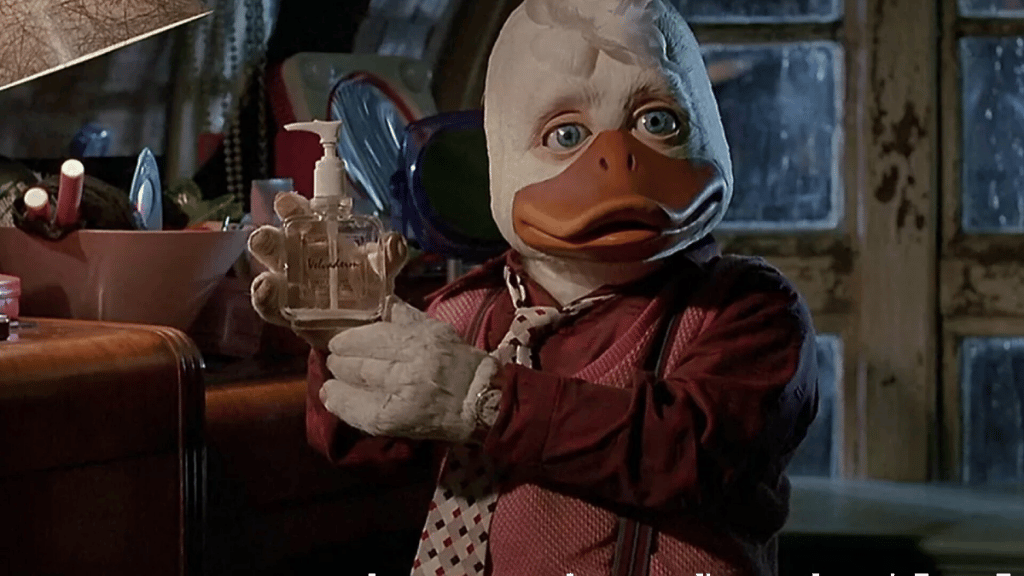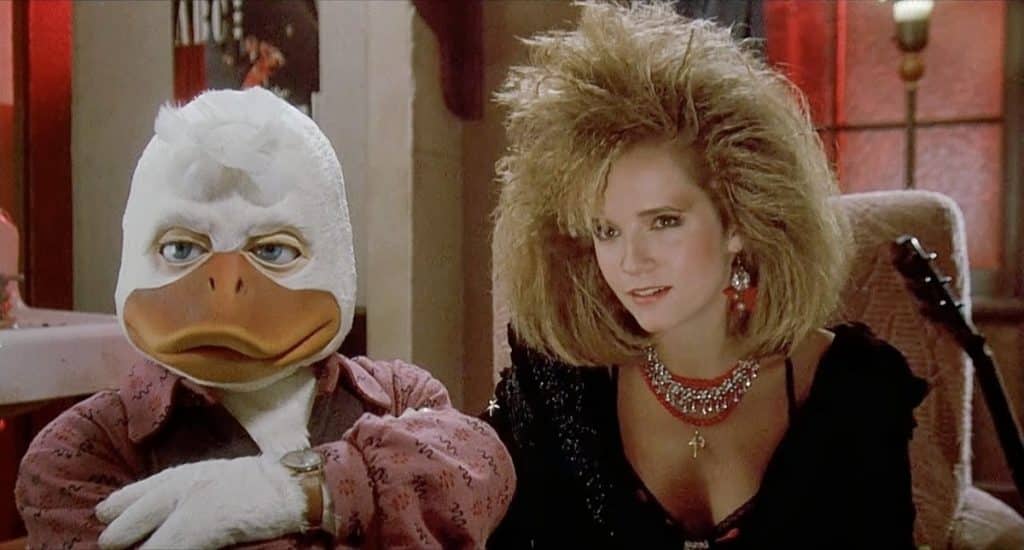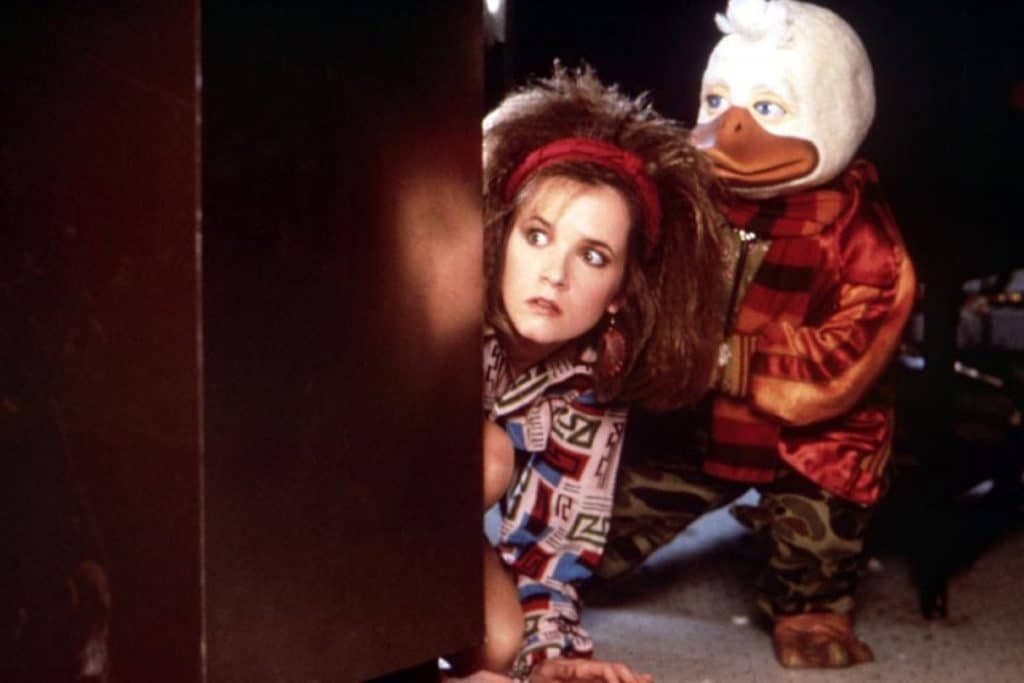Read also:
How to Watch FX Live Without CableHow To Watch AMC Without CableHow to Watch ABC Without CableHow to Watch Paramount Network Without CableIt’s an utter mess, and the costume is terrifying, but at least it’s distinct in its failure!
I must confess that when I was a younger lad, I was never into comic books. As far as I can remember, there were only three that I read with any degree of regularly: Richie Rich, for reasons that I am still at a loss to understand; Archie–even at a wee age, I had already developed a crush on Veronica Lodge; and most significantly for this essay, Howard the Duck. I was first exposed to Howard, created by Steve Gerber when my Uncle Edward included a few issues in a cache of comics that he brought to the house one day.
Something about Howard‘s distinctly bizarre concept—a duck from another world struggles to make it on Earth—clicked with me more than Marvel’s usual super-exploits, and I dug its sarcastic tone. It wasn’t perfect, and it ultimately collapsed thanks to venality on Marvel’s part. But it was, for a little while, glorious.
So, when the news got out that Howard would be coming to the big screen in the summer of 1986, I was genuinely excited. Films based on comic books were a relative rarity back then, aside from the occasional Superman film, so for Howard to get tapped for adaptation was a treat. Then there was the fact that this was going to be a big-budget extravaganza shepherded by no less of a figure than George Lucas—sure, in my book he’d failed to stick the l Star Wars‘ landing with Return of the Jedi, but his name still carried plenty of weight, especially regarding science fiction and fantasy filmmaking.
The theater’s collective realization that this movie was probably going to suck was palpable.
For those of you too young to recall, the summer of 1986 was a pretty good one at the multiplex—I have never had much use for Top Gun and Ferris Bueller’s Day Off, but they were far from the only options. Back to School, Labyrinth, Running Scared, Ruthless People, Big Trouble in Little China, Under the Cherry Moon, and, of course, Aliens. I loved all of these movies, but none of them came close to dimming my anticipation for Howard the Duck. At this time, the film was being treated with a high degree of secrecy and though my ability to be swayed by hype had already dimmed somewhat by this point, my 14-year-old self could not wait to see Howard on the big screen.
Finally, Friday, August 1 came around and my family and I made the trek out to the Woodfield Mall in Schaumburg, IL, which was then home to a pair of giant-sized theaters where we’d go to see blockbusters. We got there for the first show, only to find a massive line ahead of us. For a moment, I was worried that we might not get in but—what in hindsight was a sign—most of the people ahead of us were there to see Aliens, in the other theater. We got our tickets and joined a solidly sized crowd.
I was practically levitating in my seat with anticipation. Finally, the lights went down. Howard the Duck began with shots of an ordinary cityscape that eventually ended on a darkened apartment. The owner, presumably Howard, stepped in and wandered around, always obscured by the camera, which was more focused on punny posters and magazine covers (Splashdance anyone?). Finally, at the 2:50 mark, Howard sat back in his chair with a cigar, gracing the audience with its first clear look at his anatidaen majesty. Upon seeing Howard at last realized in the real world, a single thought came to mind:
“Oh fuck. . .”

Instead of the technological miracle that the Lucas name promised, Howard was a guy in a duck suit. And it wasn’t an especially convincing duck suit— something more at home at the opening day ceremonies at a new shopping mall than at the center of one of the most expensive movies ever made. The terror deepened when speech emanated from Howard’s poorly functioning mouth, his face frozen in the one expression molded onto the costume’s headpiece.
The theater’s collective realization that this movie was probably going to suck was palpable. And unfortunately, Howard the Duck proved utterly foul.
Howard the Duck‘s story, such as it is, sees the alien waterfowl ( performed in-costume by Ed Gale and Jordan Prentice, puppeteered by Tim Rose, Steve Sleap, Peter Baird, Mary Wells, and Lisa Sturz and voiced by Chip Zien) inadvertently transported from his home planet of Duckworld to Cleveland, Ohio. There, he is befriended by aspiring rock star Beverly Switzler (Lea Thompson). Through Beverly and nerdy would-be scientist Phil Blumburtt (Tim Robbins), Howard is eventually introduced to Dr. Walter Jenning (Jeffrey Jones), who fills him in on the hows and the whys of his inadvertent exile and attempts to send him home.

The attempt to return Howard to Duckworld goes badly. How badly? It ends with a malignant entity calling itself the Dark Lord of the Universe possessing Jenning. Inevitably, Howard must defeat the Dark Lord before he can use the machine to call an army and ravage the planet, even if doing so means sacrificing his chance to return home.
In the broadest strokes, this resembles one of Howard the Duck comics’ stories, but it swiftly becomes painfully evident that the filmmaking team of Willard Hyuck and Gloria Katz had no idea what made Howard special, or even what made him work. The comics were social satires built on oddball concepts and their Howardrocked a sarcastic, sardonic attitude that made him stand out as a protagonist.
The team’s most disastrous move in a film filled with them though was dramatically softening Howard, sanding down his trademark sarcasm in a doomed attempt to invoke the lovable charm of E.T.
Unfortunately, Hyuck and Katz decided to go in a wildly different direction. They created a tonally muddled story about yet another alien bent on destroying Earth with an avalanche of special effects and deeply dubious stabs at humor. The team’s most disastrous move in a film filled with them though was dramatically softening Howard, sanding down his trademark sarcasm in a doomed attempt to invoke the lovable charm of E.T.
The level of hatred radiating from the audience was astonishing. To make matters even worse, the only people in that auditorium who seemed to be deriving any actual enjoyment from the boondoggle unfolding on-screen were my family, which meant that I got to experience an extra layer of mortification on top of it all. By the time Howard ground to a halt, I realized that I had just witnessed the single worst film that I had ever seen in my life up to that point. Howard the Duck would hold that medal of dishonor for decades.
I’ve always enjoyed reexamining movies regarded as gigantic disasters and seeing what they offer removed from their initial shellacking. With that said, I have never felt any need whatsoever to revisit Howard. But a few years back, the annual Cinepocalypse genre film festival announced that part of their program for that year would be a screening of Howard the Duck, in 70MM no less. I am a sucker for 70MM, and I had been growing steadily disenchanted with the current wave of Marvel films, which were blending together. So, I decided to give Howard one more shot.

The presentation, courtesy of Chicago’s legendary Music Box Theatre, was top-notch. The crowd was welcomely enthusiastic. Howard the Duck was still awful. It struck out as a comedy, as a fantasy extravaganza, and as campy nostalgia. It was as bloated as it was chintzy. And the Howard outfit looked just as crummy and horrifying as I remembered it being.
That said, watching it again, I came away with two reasonably positive thoughts about it. For one, as bad as it is, the what-were-they-thinking vibe that it invoked made it slightly more appealing to me than Marvel’s current pictures. The second is that despite this utter failure of a film, Howard himself still has a lot going for him as a character (The people at Marvel seem to think so–Howard has turned up for a few cameos, most notably in the Guardians of the Galaxy films.).
Could a full-on Howard the Duck picture, faithful to the comics’ caustic heart, come to be in this day and age? On the one hand, Marvel projects continue to rake in the dough. On the other, they aren’t interested in straying too far outside a certain comfort zone in terms of content and tone. Getting Howard right requires care, precision, and a willingness to work with acid. If it happens, I’d be glad to muster up my optimism and check it out.